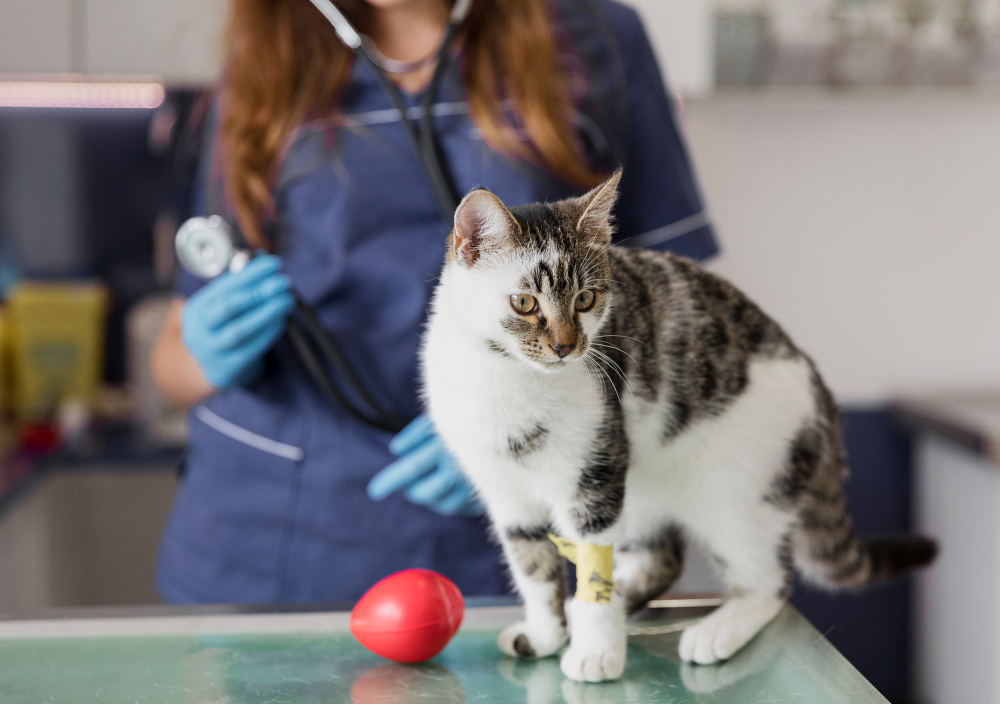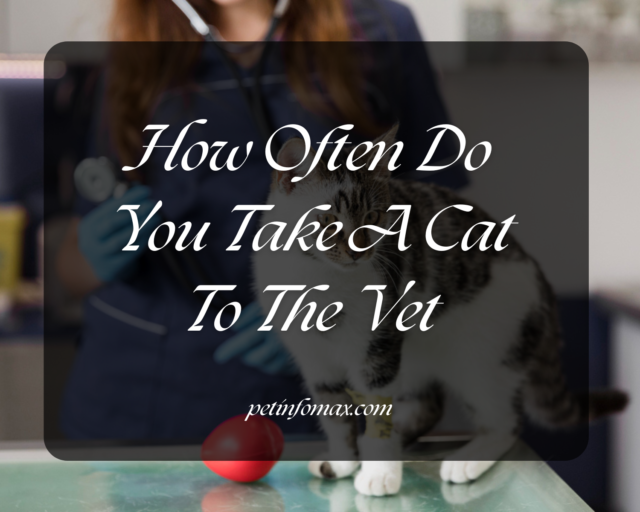Everyone loves their feline friends, and they always wish for a long but healthy life for them. As their health is most important to you, you can and should never neglect the cat vet visits.
It may come as a surprise, but findings from a 2020 research study revealed that just 40% of cat owners reported taking their pets to a veterinarian at any point, compared to 90% of dog owners.
Cats are more independent than dogs, and their self-sufficient personalities might confuse many parents, who think that they don’t need too many vet visits. That’s why the question, “How often should you take your cat to the vet?” is triggering for all feline parents.
Although the number of your cat’s vet visits depends upon your cat’s age, health, lifestyle, environment, etc., still as per the general guidelines of the American Animal Hospital Association (AAHA), they recommend every pet owner take their pet, both cats and dogs, to vets once a year for a yearly wellness checkup.
Let’s see what I happen to know about the cat’s vet visits while getting answers from my puffy’s veterinarian and researching the Internet.
How Often Do You Take A Cat To The Vet
If you see something unusual or abnormal in your cat’s body, you should visit the vet as soon as possible. They are very beautiful, loving and attention-seeker pets. If someone brings up cats, he falls into deep emotional feelings with them. He then always remains curious about their bodily health and well-being. The following are some general unusual signs and symptoms in cats when you must consider a veterinarian’s advice soon:
- Sneezes, cough and runny nose
- Decrease in frequency of eating and drinking
- Chewing one part of the body
- Changes in urination and eliminating habits
- Multiple vomitings and weight loss
- Cats show dislike of food like shrimp, treats, etc., with other signs of illness like lethargy, vomiting, diarrhea, and loss of appetite.
- Hiding or avoiding the litter box (a container used for indoor cats to urinate and defecate in; it is filled with litter and helps to absorb moisture and control odor. However, to keep the litter box hygienic for your feline’s health, it is necessary to clean the litter box regularly.)
- Bleeding and puss
- Changes in activity and sleeping habits
- Excessive licking and howling
- Symptoms of hypothermia include shivering.
These signs and symptoms show some underlying health issues in your cat.

What Is Cat’s Checkup?
To bring cats to a vet is just like taking them to a doctor for a physical examination. It is a very suitable way to catch up on various health issues present in cats at very early stages. The frequency of a cat’s visits to the vet depends on its age, lifestyle and overall health.
Why Is A Routine Cat Veterinarian Visit Important?
Veterinarians by AAFP talks about the importance of cat vet visits in their Cat Friendly Practice program. A cat vet visit is necessary when you see any abnormal signs, but remember that sometimes cat parents can’t understand the abnormal signs. For example, heart murmurs are common in cats, and detecting them at home isn’t possible. Remember that a heart problem can be asymptomatic, so how should it be possible for a feline parent to see symptoms? Enlarged thyroid gland issues in middle-aged to older cats are common and need to be examined properly. Older cats also develop arthritis and show no symptoms like lumping; they just slow down, which means they need proper treatment. So, it’s important to take your feline friend to a veterinarian once a year, irrespective of how healthy it is.
How Often You Should Take Your Cat To The Vet?
When you feel something unusual in your cat, you should visit the vet as soon as possible, but there are some standard protocols that should be adopted. The number of visits to a veterinarian for cats varies with their age, lifestyle and health condition.
Kittens Or Young Cats :
Kittens are usually from 0 to 12 months of age. These small felines need a monthly checkup, so you should try to take your cat to the vet so that they can receive the necessary vaccinations and proper checkups. Kittens need vaccination shots multiple times, like the Feline leukemia vaccine and FVRCP vaccine, which protect cats from three contagious and fatal diseases: 1. Feline Viral Rhinotracheitis, 2. Feline Calacivirus, 3. Faline panleukopenia. At this age, it is the right time to consult with the vet about neutering, spaying, and microchip services.
Spaying:
It is a surgical procedure done by a veterinarian to remove a female animal’s reproductive organs, like ovaries and uterus, to prevent unwanted pregnancies, which is quite good for your cat’s health. It is usually done in small animals like cats and dogs. Spaying also prevents certain unusual behavioral changes in these animals.
Neutering:
It is also a surgical procedure of removing testicles performed in small male animals like cats and dogs. It is helpful in controlling their population and has certain behavioral benefits as well.
Adult Cats:
Adult cats fall in the category of age from 1 to 8 or 9 years. In this age group, one annual checkup from an experienced vet is necessary. A head-to-tail examination with blood and urine testing should be done to prevent early diseases such as tooth decay, parasites, joint pain etc. The veterinarian should also give advice on the pet’s diet and nutritional requirements. Some veterinarians keep nutritional support programs in the form of charts at their pet clinics. These charts should be kept at the house where cats are brought up.
Senior Cats:
The cats older than 9 or 10 years fall in the senior age group. Age-related problems and diseases are common in this age group, so the vet must do a complete checkup twice a year (after every 6 months). If some abnormal findings are found, they should be treated properly. Geriatric care of cats demands a more protective and comprehensive approach.
In this age group, the common problems that cats can face are obesity, arthritis, dental issues, kidney, diabetes, and liver diseases.

How Often Do Cats Need To Go To The Vet? By Dr. Shelly Rubin From AVMA
Pet owners often ask questions regarding cat vet visits, and my answer is it totally depends upon what signs your cat shows. And believe me, your pet veterinarian can only interpret these signs better. The first thing to check is the cat’s behavior. Have you seen any change in your feline friend’s behavior?
A shy cat may seek more attention; it looks like a small thing but may hide a big problem, as cats are excellent at hiding their problems and pain. (That’s why a cat parent should be more attentive.)
There may be an infection, fracture, dislocation, or even more serious, like cancer, arthritis, or heart issues if you see your cat limping or paying more attention to one leg or paw.
Eating no food, drinking less water or too much water, avoiding litter boxes, reducing weight or vice versa, etc.; all these signs demand that now it’s time to prepare your cat for a vet visit.
Why Does My Cat Don’t Like To Visit Vet?
Cats often don’t like to visit the vet for many reasons. The reason may be that it brings a change in their routine life or that they have to leave their home territory for it. Moreover, the unfamiliar and strange smells and scary sounds at the clinic also make your cat afraid. The presence of other dogs and cats also stresses your cat. Let’s look at a few things that can help you lower your cat’s stress.
7 Helpful Tips By A Vet To Prepare Your Cat For A Vet Visit By PetInfoMax.com
- Use an appropriate carrier in which your cat feels comfortable
- Allow your cat to use a carrier for a few minutes daily
- Feed your cat in that carrier and make them feel that it’s not a bad or scary thing
- Take your cat outdoors often to make them comfortable
- Take your cat to the vet on time so you don’t have to wait for your turn while sitting in the waiting area with other dogs and cats
- It’s good to take your cat to a veterinarian who specializes in or has specific hours for cat appointments.
- Use medication or sprays (if your cat’s vet suggests)
Preparing For Changes:
If you are moving somewhere with your cats or want to make some changes in the lifestyle of your pets, you should consult or visit the vet soon. For instance, if you are moving to an area where the outdoor area is more than the indoor area, your cat needs extra care and vaccination, etc. In an outdoor area, pets are more prone to danger, injuries and diseases; if your cat is young or older, the risk factors increase more.
Note: The advice provided in this post is intended for informational purposes and does not constitute medical advice regarding pets. For an accurate diagnosis of your pet's condition, please make an appointment with your vet.
FAQs
You must have to take an average cat to a vet once a year. Whatever cat breed you have, indoor or outdoor, your feline’s age and size, a vet checkup is necessary once every year. However, the number of vet visits increases depending on your cat’s health and sudden need.
The general rule is to take your indoor cat to the vet once a year, but the ideal duration is after 6 months at least.
Whenever you feel any changes in your cat’s behavior (from eating to drinking, walking to pooping, biting, seeping, to interaction behavior) and weight, you should take your feline friend to the vet. However, if you see no changes in your healthy cat, still one visit to a vet every year is a must thing to do.
Wellness exams for kittens are recommended on a monthly basis, once every year for adult average cats and twice for geriatric, middle-aged, and senior cats.
Conclusion:
Stop hesitating to go to a vet when you see something unusual in your cat. Remember that the answer to the question of how often to take cat to vet is once or twice a year. Young and elder cats need extra care, so they see the vet more frequently in comparison with adult ones. Healthy and bodily fit cats look sound, cool, and handsome, and they will not be a source of infections for human beings.





